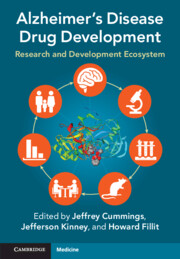Book contents
- Alzheimer’s Disease Drug Development
- Alzheimer’s Disease Drug Development
- Copyright page
- Dedication
- Contents
- Contributors
- Foreword
- Acknowledgments
- Section 1 Advancing Alzheimer’s Disease Therapies in a Collaborative Science Ecosystem
- Section 2 Non-clinical Assessment of Alzheimer’s Disease Candidate Drugs
- Section 3 Alzheimer’s Disease Clinical Trials
- 11 Phase 1 Trials in Alzheimer’s Disease Drug Development
- 12 The Importance of Phase 2 in Drug Development for Alzheimer’s Disease
- 13 Alzheimer’s Disease Drug Development in Pharmaceutical Companies
- 14 Trial Site Infrastructure and Management: Importance to Alzheimer’s Disease Drug Development
- 15 ATRI and ACTC: Academic Programs to Accelerate Alzheimer’s Disease Drug Development
- 16 The European Prevention of Alzheimer’s Disease Program: A Public–Private Partnership to Facilitate the Secondary Prevention of Alzheimer’s Disease Dementia
- 17 The Global Alzheimer’s Platform Foundation®: Delivering New Medicines Faster by Accelerating Clinical Trials
- 18 Clinical Trial Development in Frontotemporal Lobar Degeneration
- 19 Statistical Considerations in the Design and Analysis of Alzheimer’s Disease Clinical Trials
- 20 Alzheimer’s Disease Trial Recruitment and Diversifying Trial Populations
- 21 The Role of Online Registries in Accelerating Alzheimer’s Disease Drug Development
- 22 Data Safety Monitoring Boards in Alzheimer’s Disease Trials
- 23 Globalization of Alzheimer’s Disease Clinical Trials
- 24 The Use and Development of Clinical Measures of Alzheimer’s Disease Trials
- 25 Tele-Trials, Remote Monitoring, and Trial Technology for Alzheimer’s Disease Clinical Trials
- 26 Expanded Access and Compassionate Use in Alzheimer’s Disease Drug Development
- 27 The Role of the Contract Research Organization in Alzheimer’s Disease: The Vital Link in the Clinical Drug-Development Program
- 28 The Role of Regulatory Agencies in Alzheimer’s Disease Drug Development
- 29 Alzheimer’s Disease Clinical Trial Study Partners
- 30 From Trials to Practice: Are We Ready for a Disease-Modifying Treatment?
- 31 Best Practices for Clinical Trials during COVID-19
- Section 4 Imaging and Biomarker Development in Alzheimer’s Disease Drug Discovery
- Section 5 Academic Drug-Development Programs
- Section 6 Public–Private Partnerships in Alzheimer’s Disease Drug Development
- Section 7 Funding and Financing Alzheimer’s Disease Drug Development
- Index
- References
22 - Data Safety Monitoring Boards in Alzheimer’s Disease Trials
from Section 3 - Alzheimer’s Disease Clinical Trials
Published online by Cambridge University Press: 03 March 2022
- Alzheimer’s Disease Drug Development
- Alzheimer’s Disease Drug Development
- Copyright page
- Dedication
- Contents
- Contributors
- Foreword
- Acknowledgments
- Section 1 Advancing Alzheimer’s Disease Therapies in a Collaborative Science Ecosystem
- Section 2 Non-clinical Assessment of Alzheimer’s Disease Candidate Drugs
- Section 3 Alzheimer’s Disease Clinical Trials
- 11 Phase 1 Trials in Alzheimer’s Disease Drug Development
- 12 The Importance of Phase 2 in Drug Development for Alzheimer’s Disease
- 13 Alzheimer’s Disease Drug Development in Pharmaceutical Companies
- 14 Trial Site Infrastructure and Management: Importance to Alzheimer’s Disease Drug Development
- 15 ATRI and ACTC: Academic Programs to Accelerate Alzheimer’s Disease Drug Development
- 16 The European Prevention of Alzheimer’s Disease Program: A Public–Private Partnership to Facilitate the Secondary Prevention of Alzheimer’s Disease Dementia
- 17 The Global Alzheimer’s Platform Foundation®: Delivering New Medicines Faster by Accelerating Clinical Trials
- 18 Clinical Trial Development in Frontotemporal Lobar Degeneration
- 19 Statistical Considerations in the Design and Analysis of Alzheimer’s Disease Clinical Trials
- 20 Alzheimer’s Disease Trial Recruitment and Diversifying Trial Populations
- 21 The Role of Online Registries in Accelerating Alzheimer’s Disease Drug Development
- 22 Data Safety Monitoring Boards in Alzheimer’s Disease Trials
- 23 Globalization of Alzheimer’s Disease Clinical Trials
- 24 The Use and Development of Clinical Measures of Alzheimer’s Disease Trials
- 25 Tele-Trials, Remote Monitoring, and Trial Technology for Alzheimer’s Disease Clinical Trials
- 26 Expanded Access and Compassionate Use in Alzheimer’s Disease Drug Development
- 27 The Role of the Contract Research Organization in Alzheimer’s Disease: The Vital Link in the Clinical Drug-Development Program
- 28 The Role of Regulatory Agencies in Alzheimer’s Disease Drug Development
- 29 Alzheimer’s Disease Clinical Trial Study Partners
- 30 From Trials to Practice: Are We Ready for a Disease-Modifying Treatment?
- 31 Best Practices for Clinical Trials during COVID-19
- Section 4 Imaging and Biomarker Development in Alzheimer’s Disease Drug Discovery
- Section 5 Academic Drug-Development Programs
- Section 6 Public–Private Partnerships in Alzheimer’s Disease Drug Development
- Section 7 Funding and Financing Alzheimer’s Disease Drug Development
- Index
- References
Summary
The data safety monitoring board (DSMB), also known the data monitoring committee, is a multidisciplinary team of scientific experts that serve an advisory role within the operation of clinical trials. The principle responsibility of a DSMB is to monitor the conduct of trials for concerns related to participant safety and data quality through the review of interim data analyses, and then to advise trial leadership whether a study is appropriate to continue, needs to modify procedures, or should be terminated. An emphasis is placed on the responsibility of the DSMB to safeguard the rights and well-being of study participants, so it is common to see the incorporation of a DSMB into a study protocol when a trial explores an intervention with high participant risk, a trial is working with a large number of participants, or when a study is working with a particularly vulnerable population, like Alzheimer’s disease (AD) patients. This chapter reviews common DSMB roles and responsibilities as well as highlighting examples of DSMBs in practice in AD clinical research.
Keywords
- Type
- Chapter
- Information
- Alzheimer's Disease Drug DevelopmentResearch and Development Ecosystem, pp. 266 - 274Publisher: Cambridge University PressPrint publication year: 2022



